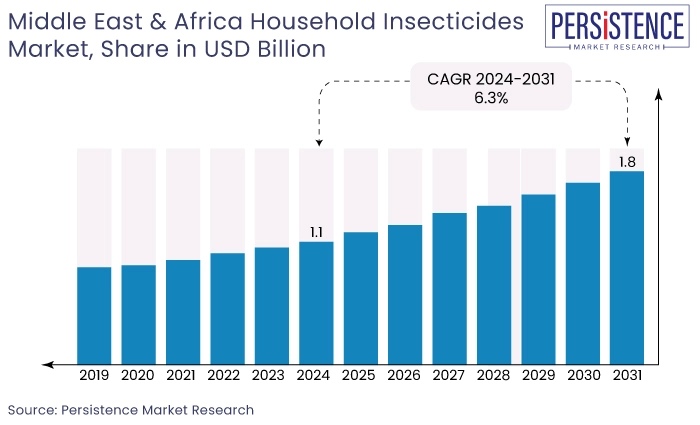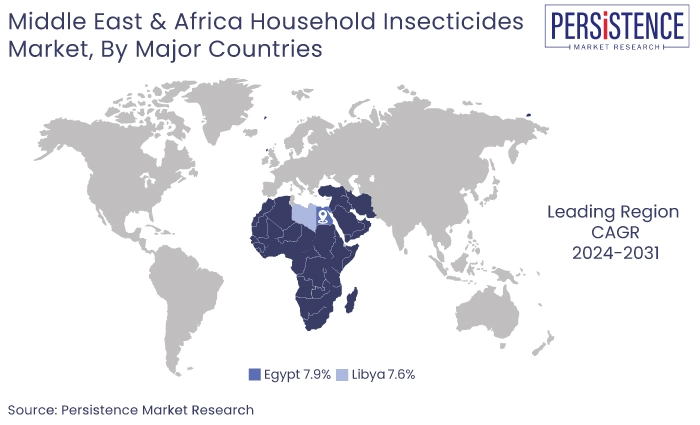Industry: Consumer Goods
Published Date: July-2024
Format: PPT*, PDF, EXCEL
Delivery Timelines: Contact Sales
Number of Pages: 185
Report ID: PMRREP34625
The Middle East & Africa household insecticides market is expected to increase from US$1.1 Bn in 2024 to US$1.8 Bn by the end of 2031. The market is expected to secure a CAGR of 6.3% during the forecast period between 2024 and 2031.
Key Highlights of the Market
|
Attributes |
Key Insights |
|
MEA Household Insecticides Market Size (2024E) |
US$1.1 Bn |
|
Projected Market Value (2031F) |
US$ 1.8 Bn |
|
Forecast Growth Rate (CAGR 2024 to 2031) |
6.3% |
|
Historical Growth Rate (CAGR 2019 to 2023) |
5.3% |
One of the significant factors that drive the expansion of the market in the Middle Eastern and African regions is the rise in availability and affordability of a huge array of insecticide products.
Various companies are innovating to satisfy different consume preferences such as focusing on the production of safe and eco-friendly formulations, which resonate with environmentally conscious consumers.
The diverse climates across the Middle East & Africa region foster a rich ecosystem for a myriad of pests. Household insecticides play a crucial role in safeguarding homes and communities against these diverse pests, which include mosquitoes, flies, cockroaches, and rodents.
Growing awareness and concerns about hygiene and health play an important role in driving market demand. Consumers are increasingly aware of the risks associated with insect-borne diseases and seek effective solutions to protect themselves and their families.
Rising awareness levels drive the adoption of household insecticides as a preventive measure, particularly in households with children and elderly individuals who are more susceptible to such diseases
There is growing demand for pest control services to ensure clean urban living spaces with more people prefer to shift to cities. Moreover, the industry players are manufacturing advanced formulations such as aerosols, baits and slow-release technologies to satisfy the local needs as well as challenges.
Increase in urban sprawl give rise to conditions for pest infestations that necessitate a growing demand for household insecticides. Arid climate of this region worsens pest issues further especially in densely populated urban areas where both the sanitation and hygiene challenges continue.
The market for household insecticides is expanding significantly with many households look for best solutions to deal with pests such as ants and mosquitoes.
Traditional societies around the Middle East and Africa region have long relied on natural remedies including plant extracts as well as aromatic herbs to prevent household pests and safeguard hygiene living conditions. The threat of vector-borne illnesses accelerates the household insecticides adoption.
Diverse climate in the Middle East and Africa region creates favourable conditions for a huge array of pests. Pests such as flies, rodents and mosquitoes can be protected with household insecticides.

Increase in Vector-Borne Diseases
Household insecticides play a crucial role in controlling mosquitos which are the primary vectors for diseases like malaria, dengue fever, and Zika virus.
According to the WHO, vector-borne diseases are a significant source of morbidity and mortality in countries of the Middle East and North Africa, which make up part of the WHO Eastern Mediterranean Region.
Countries in this region suffer a disproportionate share of the global burden of vector-borne diseases. Therefore, the demand for insecticides with proven efficacy against mosquitoes and other disease-carrying insects has surged as communities seek effective measures to safeguard their health.
Increase in food Safety Concerns
Traditional cooking methods and communal dining are commonly followed in households across the Middle East and Africa. Maintaining food hygiene is important and common practice followed in the region.
Consequently, there is growing awareness among people to keep their kitchens clean and free from pests for preventing foodborne illnesses and secure the health of their families.
Household insecticides play a crucial role here, providing an efficient solution to control pests in in sensitive areas, offering a protection barrier against infestations.
With the progress of modernization and urbanization in the region, the demand for effective and convenient pest control solutions is estimated to increase further, fueling the expansion of household insecticides market growth in MEA.
Nature of Household Insecticides
Insect repellents are known to be toxic and can lead to health issues. Many studies have proven that insecticides and insect repellents can have long-term effects.
This is a primary factor negatively impacting the growth of the market. For instance, DEET (N,N-Diethyl-meta-toluamide), used in insect repellents, is toxic and can have long-term effects.
Moreover, latest results have also proved that DEET is a neurotoxin that increases the toxicity of the other chemicals in a product. This key factor significantly impedes the market growth during the projection period.
Increasing Preference for Targeted Pest Control
Broad-spectrum chemicals are used in traditional insecticides, which can kill different insects including those, which play important roles in pollination and natural pest control.
Companies get a chance to manufacture insecticides with highly selective action modes, efficiently targeting pest species while reducing collateral damage to beneficial insects.
The development of targeted pest control solutions aligns with broad environmental and regulatory trends favoring sustainable and eco-friendly products.
Governments and regulatory bodies are increasingly scrutinizing the use of conventional insecticides due to their potential impacts on non-target organisms and the environment.
By offering insecticides designed to minimize harm to beneficial insects, companies can position themselves as leaders in sustainability and compliance with emerging regulations.
Demand for Multi-purpose Formulations to Tackle Common Infestations
Consumers prefer multi-purpose formulations to deal with common infestations. This approach simplifies the buying process for consumers and also lessens the clutter of numerous insecticides products in homes.
Such formulations provide long-lasting residual effects and immediate knockdown, ensuring complete pest control over time.
The versatility of multi-purpose formulations extends beyond residential use to both institutional and commercial settings, where effective pest management is similarly important.
By capitalizing on the market opportunities, companies can differentiate themselves, enhance customer satisfaction, and capture a larger share of the household insecticide market.
Mosquito Repellents to Display 7.3% CAGR Through 2031
|
By Application - Category |
CAGR through 2031 |
|
Mosquitoes |
7.3% |
|
Cockroaches |
6.2% |
The mosquitoes segment is estimated to lead the Middle East and Africa household insecticide market exhibiting a CAGR of 7.3% through 2031.
Mosquitoes are vectors for different deadly illnesses such as Zika, Malaria, dengue and more. The region is especially vulnerable to such illnesses because of its climatic conditions making mosquito control a high priority for public health.
Humid and warm climate of this region provides ideal breeding conditions for mosquitoes. Such pests are extremely abundant and pose a threat to human health, requiring mosquito control measures.
There are several communities in the Middle East region that have outdoor-centric lifestyles with people go for work and social activities outdoor. Such exposure to outdoor environments surges the risk for mosquito bites as well as disease transmission, fueling the need for mosquito control solutions.
Egypt to Record a Notable CAGR of 7.9% in the Market
|
Country |
CAGR through 2031 |
|
Egypt |
7.9% |
|
Libya |
7.6% |
Household insecticides market in Egypt continues to grow with the increasing demand for insect control products. Urbanization trends and population size contribute toward increasing demand for insect control products.
The market in Egypt is estimated to record a CAGR of 7.9% during the forecast period from 2024 to 2031.
Insect-borne diseases such as malaria, dengue fever, and West Nile virus are prevalent in Egypt, making insect control products essential for public health. This drives the demand for effective household insecticides.
Household insecticides are widely distributed across Egypt through various retail channels, ensuring accessibility to both urban and rural populations.
Egypt's climate, characterized by hot summers and proximity to bodies of water like the Nile River, creates ideal breeding grounds for insects. This necessitates constant use of insecticides in households.

April 2023
SC Johnson has partnered with the Tanzanian government to eradicate malaria with a US$ 1.5 million investments in malaria diagnosis, treatment, and prevention in Tanzania's highest malaria transmission areas. The multinational company based in the United States expressed its official commitment, together with new Public Private Partnerships, to combat malaria.
July 2021
SC Johnson, the company behind popular home treatments including OFF! ® and Raid®, announced the creation of a unique pest index to get rid of pests such as cockroaches, ants, ticks, and mosquitoes.
Competition in the market is driven by continuous innovation in formulations, packaging, and application methods. Companies invest in research and development to introduce products that are more effective, environmentally friendly, and safer for use in households.
Players in the market compete among themselves to emerge as the leader, whereas the small-scale and local manufacturers compete with these players with local manufacturing advantages and lower prices.
As there is significant scope for market expansion, new players are anticipated to enter the market through partnerships and collaborations as well as existing players will focus on expanding their production capacities.
Prominent manufacturers are engaged in strategic acquisitions/mergers, and collaboration activities to expand the company’s geographical presence to relish the maximum opportunity created in the market.
Industry players are consistently engaged in the research and development of new and innovative products to cater to the changing consumer demand. In addition, key manufacturers are engaged in geographical expansion to manifest the opportunity created in emerging economies
Companies such as SC Johnson, Reckitt Benckiser, and Henkel dominate significant market share due to their established brands, extensive distribution networks, and strong market research and development capabilities. These companies often introduce innovative products and marketing strategies that set benchmarks in the market.
|
Attributes |
Details |
|
Forecast Period |
2024 to 2031 |
|
Historical Data Available for |
2019 to 2023 |
|
Market Analysis |
US$ Billion for Value |
|
Key Countries Covered |
|
|
Key Market Segments Covered |
|
|
Key Companies Profiled |
|
|
Report Coverage |
|
|
Customization & Pricing |
Available upon request |
By Product Type
By Sales Channel
By Application
By Nature
By Country
To know more about delivery timeline for this report Contact Sales

The market is expected to secure a CAGR of 6.3% during the forecast period.
Increase in vector-borne disease concerns is driving the market.
AVIMA, ASTRACHEM, and Reckitt Benckiser Group plc are some of the key players operating in the market.
The Middle East & Africa household insecticides market is expected to increase from US$1.1 Bn in 2024 to US$1.8 Bn by the end of 2031.
Increasing preference for targeted pest control is a key opportunity in the market.